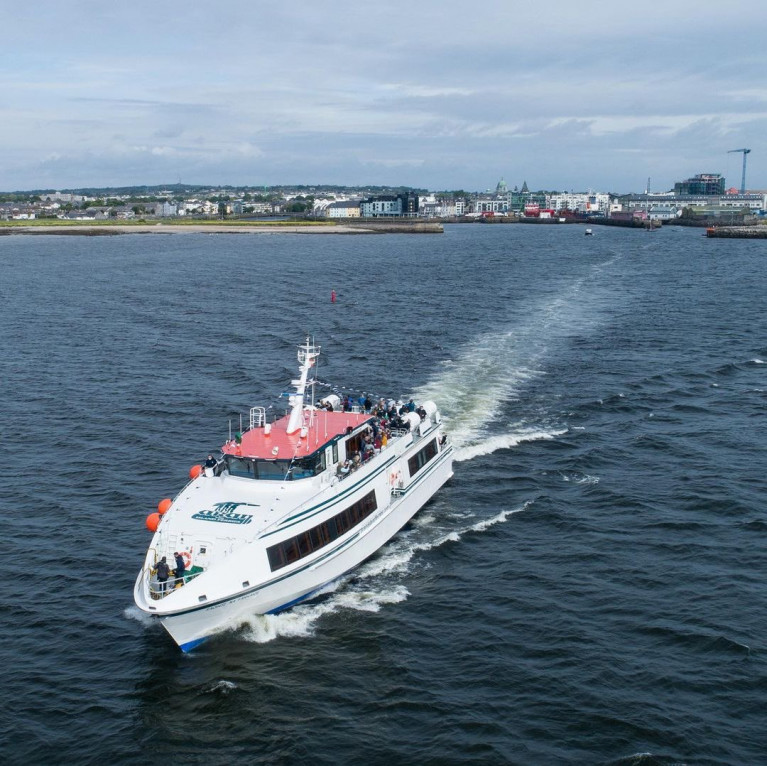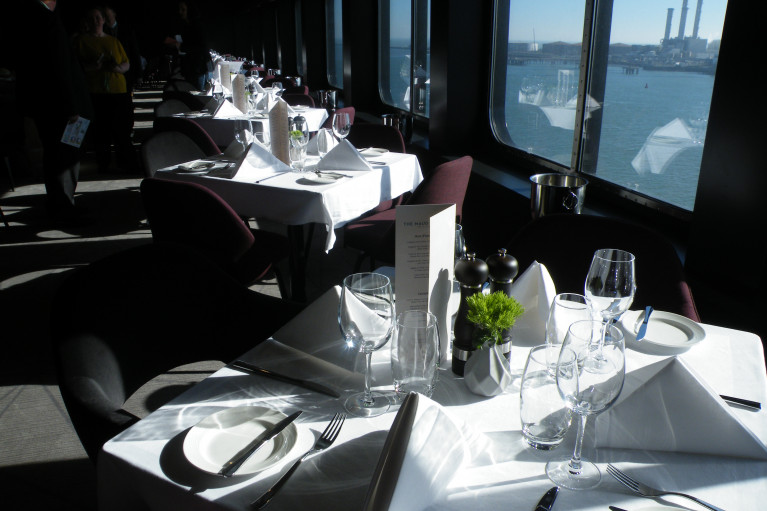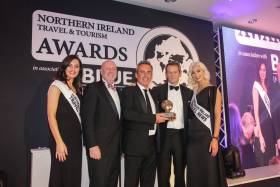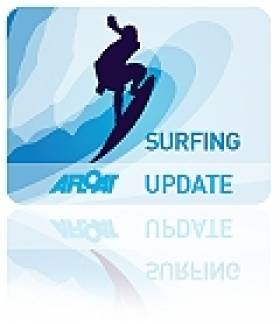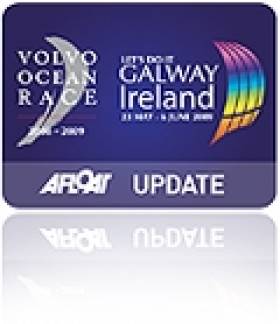Displaying items by tag: Tourism Ireland
Galway-Aran Islands Ferry Operator Attends Tourism Ireland Promotion to Belgian & Dutch Travel Agents
The focus was on Galway, as the west coast city’s attractions and region were promoted to 50 overseas tourism operators from Belgium and neighbouring Netherlands.
Galway was also been promoted to travel agents at Tourism Ireland’s B2B workshops events held in the Belgium capital of Brussels and Amersfoort, a city south-east of Amsterdam.
Among those attending the workshops Galway FM reports, with one to one meetings with the travel trade on 12th September included Aran Island Ferries and Killary Fjord Boat Tours.
With its direct ferry service to the Aran Islands and also out of Rossaveel, Aran Island Ferries represented their five-fleet operations and tourism product to the travel trade. Another Co. Galway based excursion operator, Killary Fjord Boat Tours which runs along the boundary with Co. Mayo was present at the Tourism Ireland event where around 35 outlets of the Dutch media were invited.
Both operators were signing contracts for the season of 2024 and beyond, so the events held in both nations provided a key time to influence the addition of new tourism products to their programmes.
Other tourism businesses and operators from the island of Ireland, Afloat adds included Irish Ferries which operates the UK landbridge to mainland Europe via Dover-Calais, with the French port close to Belgium. In addition to their direct Cherbourg connection to Dublin.
Bookings Increase at Brittany Ferries as More French Tourists Choose Ireland for Holidays
Operator Brittany Ferries has announced that this year's bookings, in and out of Cork and Rosslare, are up by 44 per cent on figures for 2019, the last ‘normal’ year before Covid disrupted travel and holiday plans.
The company's Irish general manager Hugh Bruton said that while it is still early in the year, numbers travelling on all Brittany Ferries’ routes to and from both France and Spain are showing healthy increases.
“Undoubtedly the lack of travel during the last two years has created pent-up demand, particularly amongst Irish holidaymakers travelling abroad. But we are also seeing healthy increases in the number of French and Spanish visitors coming to Ireland.
“While the UK has always been the primary destination for French customers, across our total Ireland/UK business currently we are attracting 49 per cent of all the French holidaymakers travelling with the company, to Ireland. Those numbers are unprecedented.”
Last month, Brittany Ferries’ President Jean Marc Roué and the company's chief executive Christophe Mathieu were in Ireland to make a number of important investment announcements in relation to the company's long-term commitment to its Irish routes.
They confirmed that the new midweek sailing launched last year connecting Cork with France and operated by cruise-ferry Armorique (see photo) will become a permanent feature of the company’s sailing schedule in future years.
They also announced that in November of this year they would be introducing a larger and more cruise-orientated ship Galicia on their Rosslare-Bilbao route, replacing Connemara. The Galicia cruise-ferry is one of the newest additions to the Brittany Ferries fleet having been launched in December 2020.
Speaking in relation to the announcement Siobhan McManamy, Acting Chief Executive of Tourism Ireland, said: “As we restart overseas tourism to Ireland this year, the announcement that Brittany Ferries’ bookings for sailings from Roscoff to Cork and from Cherbourg and Bilbao to Rosslare are up by 44 per cent on 2019 is very good news and a real vote of confidence in Irish tourism.
“As an island, the importance of convenient, direct access cannot be overstated – it is absolutely critical to achieving growth in inbound tourism. We already work very closely with Brittany Ferries and we look forward to continuing to co-operate with them to maximise the promotion of their services.”
Companies throughout Galway have been promoted to more than 50 top tour operators and travel agents from Sweden, Denmark, Norway and Finland at a trade workshop held recently in Scandinavia.
Moycullen-based North & West Coast Links Golf Ireland and Aran Island Ferries (incl. Cliffs of Moher) took part along with 23 other businesses at Tourism Ireland’s 2022 Nordic trade workshop in Copenhagen, Denmark.
At the event, Irish businesses met with Nordic travel professionals, to encourage them to extend their Ireland offering, or to include Ireland for the first time in their brochures and programmes.
The key message was that Ireland is open for business again, and cannot wait to welcome back Nordic visitors.
Asides the Galway City Docks-Aran Islands (Inishmore) route, Afloat highlights those available from Rossaveel, Connemara and from Doolin in Co. Clare. At Doolin Pier there are other ferry operators also connecting to all three Aran Islands of Inishmore, Inishmean and Inisheer.
In addition running out of Doolin, coastal excursions head along to the spectacular Cliffs of Moher.
More from Galway Daily on the tourist trade promotion.
Irish Tourism Industry Demands VAT Cut
The tourism industry in Ireland has said it can deliver growth of 65% if the incoming government restores the 9% Vat rate.
The Irish Tourism Industry Confederation published its election manifesto today and said Brexit, weakened demand and increased costs of business have resulted in revenue falling by 1% in 2019 with regional Ireland hit hardest.
The confederation is made up of tourism businesses and stakeholders including Aer Lingus, B&B Ireland, Irish Ferries, the Restaurant Association of Ireland and the Vintner’s Federation of Ireland.
Along with a Vat reduction, the confederation said the cost of insurance must also be addressed.
For more on this story from BreakingNews.ie click here.
‘Best Ferry Company’ As Stena Line Win for 25th Time
#ferryaward - After winning a top ferry company award, Stena Line celebrated a record-breaking 25th time at the annual Northern Ireland Travel and Tourism Awards.
The ‘Best Ferry Company’ award was presented to Paul Grant, Stena Line’s Trade Director, Irish Sea North (ISN) at the awards ceremony last Friday at the Slieve Donard Resort and Spa in Newcastle, Co Down.
Northern Ireland Travel News has organised these prestigious awards for the past 26 years and this year’s ceremony was hosted by BBC's Pointless presenter Alexander Armstrong. The ceremony was attended by more than 430 guests and travel industry VIPs from all over the UK and Ireland.
Almost 30 awards were presented on the night, decided by votes from the travelling public, the travel trade, and by travel and tourism industry leaders.
Orla Noonan, Stena Line’s Travel Commercial Manager (ISN) said: “It’s an honour for Stena Line to receive this prestigious award coming as it does from our peers across the travel industry.
“Although this is our 25th consecutive year of winning the award we take absolutely nothing for granted and realise that each year we have to work even harder to provide our customers with a service which really is ‘award winning’.
“Whilst the travel industry is constantly changing and reinventing itself in an increasingly digital world, putting the needs of the customer first, every time, still remains the key objective for our business success, “added Orla.
Stena Line is the largest ferry operator on the Irish Sea, offering the biggest fleet and the widest choice of routes between Ireland to Britain including Belfast to Liverpool and Heysham, Belfast to Cairnryan, Dublin to Holyhead and Rosslare to Fishguard routes, a total of 228 weekly sailing options between Ireland and Britain.
In addition the ferry operator has a direct service from Rosslare to Cherbourg with three return crossings a week. Approximately three million passengers each year are carried on its Irish Sea routes, more than its rival ferry operators combined.
#ferry - A joint campaign has been launched in the UK by Stena Line and Tourism Ireland which will be seen by over 3 million people.
The new campaign invites people to stir their soul and travel Fishguard-Rosslare to enjoy a short break in Ireland.
Highlighting the country’s Ancient East including counties such as Wexford, Waterford and Kilkenny, the campaign targets the ‘culturally curious’ audience across Britain. The campaign includes radio ads, which will reach over 1.73 million listeners in London, South West England and Wales and online ads.
Diane Poole OBE, Stena Line’s Travel Commercial Manager Irish Sea South said: “Through the launch of this new campaign in association with Tourism Ireland, we hope to inspire people to stir their soul and visit Ireland whilst highlighting the ease of access when travelling by ferry. Through the advertising channels we have invested in, it is expected that over 3 million people will be able to see the promotion of Ireland’s Ancient East.”
Julie Wakley, Tourism Ireland’s Head of Britain added: “We are delighted to partner with Stena Line and Rosslare Europort once again, to maximise the promotion of the Stena Line service from Fishguard to Rosslare. Our aim is to boost car touring visitor numbers to the South East and Ireland over the coming months; visitors who bring their car on holidays tend to stay longer, spend more and are more likely to visit more than one region.”
Top German Surfer Tries Ireland's Waves for Size
#SURFING - One of Germany's top surfers was in Ireland last week to sample some of Ireland's biggest waves, InsideIreland.ie reports.
Sebastian Steudtner was in Sligo to films a series of online views for Tourism Ireland in Frankfurt to pique the interest of German surfers and holidaymakers.
As well as mountain biking at Knocknarea and Union Woods, Steudtner took on the monster swells at Mullaghmore Head - made popular among the world's big wave surfers by the Tow-In Surf Session that's now in its second year.
The 'teaser' videos for a larger TV and online project will be premiered next week at the Berlin International Film Festival before hitting the web later in spring.
Kristina Gauges of Tourism Ireland said: "This is a fantastic opportunity to showcase the world-class surfing and adventure product available in this part of Ireland to a niche audience in Germany."
InsideIreland.com has more on the story HERE.
Volvo Ocean Race in Galway Will See Irish Food in Focus
#VOLVO OCEAN RACE - Top chef Maurice Keller was in Abu Dhabi last week to fly the flag for Irish food at the third stopover of the Volvo Ocean Race, Waterford Today reports.
Keller spent a few days away from Waterford's Arlington Lodge to join members of Good Food Ireland, Tourism Ireland and Irish embassy staff for a special 'Ireland Day' at the VOR Village.
The initiative was designed to promote Ireland as a prime tourist destination ahead of this summer's Volvo Ocean Race visit to Galway.
And food will play a major role in efforts to attract visitors to the finish line in Galway this July, according to the Limerick Post.
Foodies from across the mid-west will converge at a 'Foodie Forum' at the Galway-Mayo Institute of Technology on 2 Feburary, where plans to showcase Irish food in the city will be top of the agenda.
“At the launch of the countdown to the Volvo Ocean Race, the Let's Do It Galway team announced the four main pillars of the race next summer – marine, green, innovation and food," said Cáit Noone, head of the Hotel School at GMIT.
"The food pillar will provide Ireland with a global showcase opportunity to share with the world our food experiences and the outstanding locally sourced produce we have to offer.”




























